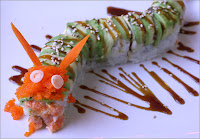With out much discussion about where to eat we decided to go to Moshi Moshi in downtown Northampton. The wife and I both love Japanese and Korean food and are always searching for places to find it prepared well. I had heard good things about the place and know a few people who eat at the sushi bar regularly so we decided to give it a try.
We got there at about 6pm on a Friday and the sushi bar was already full with boisterous customers laughing at something the chef was doing. As we discussed where to sit one customer offered some unsolicited advice to us to "Try the caterpillar roll. It's AMAZING!" She explained. Feeling a little overwhelmed we decided to venture upstairs for a table. The chef was apparently doing a good job of entertaining the crowd downstairs with both his food and comedy act. After navigating the narrow spiral staircase we were both surprised with the upstairs space. It was small but had a nice view of downtown so we sat right next to the window overlooking Rt. 9.
We were both very hungry and wanted to order a lot of food, and we did. We ordered the oysters on the half shell special, vegetable gyoza, kal-bi ribs, beef yakisoba and two glasses of white wine. The gyoza came first, to my surprise, and they were delicious. They were clearly made in house and had a bright green filling that was visible through the thin and crispy wrappers. I was happy they weren't the same frozen gyoza every other place in town seems to serve. They were served with a "tempura sauce" that was made with soy and scallions. It was pretty standard but good.
Next our server brought us our miso soup and salad that came with the entrees we ordered. They were both good, the mixed greens seemed fresh and the miso was hot with plenty of wakame, tofu and scallions. It's pretty hard to go wrong with that.
While waiting for our next round of food my wife and I both realized how horrible our wine was. I don't remember what the name of the winery was or where it was from but it was the only white they had by the glass, probably a sauvignon blanc. We both agreed we were happy we hadn't decided to get a bottle, which we had discussed, because it tasted like a $4 bottle. I think we paid about $6 for the glass.
Next our entrees came out. At this point I realized we still hadn't got our oysters. I started to get a little frustrated when our server quickly sprang up the stairs with them. It seemed an odd point in the meal to eat raw oysters but I'm not one to shy from their cold, oceany goodness. They were topped with a fair amount fish roe, ponzu and scallions which slightly overpowered the oyster but was still good.
The kal-bi ribs were served on a cast iron platter with rice and broccoli. The ribs were charred nicely and had a light glaze on them that was pleasantly spicy. Not as spicy as some I've had elsewhere but they were tender, moist, fragrant and delicious. I was more than happy.
The beef yakisoba was served on egg noodles with mushrooms, carrots, scallions and broccoli. In the few bites my wife decided to part with I thought it seemed really well done. Crunchy vegetables, tender meat, sweet/spicy sauce. She apparently agreed because she inhaled the whole bowl in what seemed like seconds.
At that point we were stuffed and passed on desert. We already had other plans for desert elsewhere, good beers from the Dirty Truth. What? That's considered a desert in my book.
Overall the food was good. The prices were a little high, I thought, with the ribs costing $20 and the wine was horrid for $6/glass (which, yes, is cheap but still, come on...) but we were both very satisfied with our dinner. Next time I'd stick to the Saporo or maybe some sake. As we came down the stairs excited about our upcoming "desert" the downstairs was still full of customers and laughs. The chef made a point to ask how the food was and to wish us a goodnight while wearing some kind of creepy mask. I was a little confused but it was pretty funny, I can see the draw of sitting at the sushi bar. Good food and a little entertainment.
If you've never been, go. The Valley Bowl RECOMMENDED.


